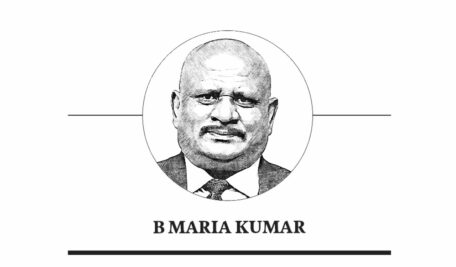Opinion: True peace begins in the mind
A genuinely peaceful individual, who understands peace wholeheartedly, is unlikely to harm others due to their inner authenticity

By B Maria Kumar
As the world watches, efforts are slowly unfolding to bring the Ukraine-Russia conflict to a hopeful and peaceful resolution. However, amid these attempts, strong confrontational rhetoric has already emerged from different sides. These heated exchanges are worsening an already tense situation. While some argue for expanding nuclear deterrence, others strongly advocate for denuclearisation. These contrasting perspectives highlight the deep concerns surrounding the conflict.
Also Read
For the past three years, the world has witnessed fast-changing global scenarios, causing enormous suffering for humanity. This agonising pain is not only physical and socioeconomic but also emotional and spiritual. The uncertainties and insecurities created by the ongoing war have pushed people not just in Eastern Europe but even elsewhere into a survival mindset, enduring food shortages, energy crisis etc. In this precarious state of affairs, many have become so preoccupied with fending for themselves that they struggle to reflect on the true meaning of life.
Draining Ordeal
There is also a growing sense of scepticism and anxiety, which seems even more pronounced than what was felt during World War II. This trend is particularly visible in many affluent countries, a few of which have enjoyed till recently high levels of financial stability, happiness, well-being and peace. However, today, they are witnessing a general decline in these very aspects, forcing people to question what went wrong. Unlike natural disasters or unavoidable accidents, this draining ordeal is not beyond human control. Every misstep that has led to the current phase of psychological distress, loss of joy and weakening of social trust is human-made.
Some wise philosophers and public intellectuals have pointed out that such periods of turmoil are a routine part of history. Nevertheless, they also emphasise optimistically that humanity can navigate these difficulties in a fruitful manner.
Throughout the ages, science and research have helped people improve their prosperity, comfort and well-being. Inventions and discoveries have revealed new insights about the human body and mind, allowing people to adopt healthier lifestyles. Yet, as many have realised, health and wealth alone don’t suffice. This is why theories of happiness and meaning have gained more attention in recent times.
Concept of Happiness
Great minds have explored the concept of happiness from different angles. Nobel laureate Daniel Kahneman, a celebrated psychologist, argued that happiness is fleeting. He believed it is not a stable or enduring state but rather a temporary feeling that comes and goes. Others, however, have suggested that health and happiness solely do not complete a person’s life. They argue that people also need purpose and meaning. Viktor Frankl, a Holocaust survivor, provided a unique perspective. He believed that even in extreme suffering, people can find meaning. According to him, independent thinking and helping others can give life an abiding sense of meaning, even in the worst conditions.
In the latest developments, Shigehiro Oishi, a psychology professor at the University of Chicago, has expressed his own views, which are critical of the established notions of happiness and meaning. He questioned whether being happy automatically leads to life satisfaction. He argued that life is much more than just being happy. This predicament consequently raises a more serious question — what if the meaning and purpose that the people set for themselves are not truly real, but merely illusions?
The uncertainties and insecurities created by the ongoing war have pushed people not just in Eastern Europe but even elsewhere into a survival mindset, enduring food shortages, energy crisis, etc
Another influential thinker and historian, Yuval Noah Harari offers a thought-provoking reasoning in this respect. In his latest book, he points out that many facets of modern human life are disconnected from authenticity. He suggests that people are often influenced by social systems which have been built on fictional narratives and fabricated ideologies. This echoes the powerful words of Friedrich Nietzsche, a 19th century German philosopher who once said, “Sometimes, people don’t want to hear the truth because they don’t want their illusions destroyed.”
Happiness Model
Meanwhile, Oishi has presented a unique interesting model — one that moves beyond wealth, health, happiness, meaning, and purpose. He calls it psychological richness. According to him, a fulfilling life is not just about being happy or having meaning. Instead, it involves creating a variety of life experiences. He suggests that people should engage in different kinds of activities and adventures however small they may be, learn from them and keep moving forward. Yet, even this approach comes with risks and uncertainties. Life’s unexpected hardships can create bad memories, making this pursuit quite taxing sometimes.
Considering the varied and unpredictable nature of life, perhaps the most reliable source of reason for existence and contentment is peace of mind. Unlike monetary success, happiness, purpose or even psychological richness, peace of mind can exist on its own. A person can be poor, unhealthy, unhappy, without clear goals or even lacking diverse experiences, but still can find peace.
Mental peace is a powerful ideal to attain, but helping others find peace is an even greater virtue. This idea is especially relevant today, as the world faces multiple crises, instability, frantic disorder and uncertainty at an accelerating rate. Since peace of mind is not something that is achieved once and for all, it requires a continuous effort. It depends on developing the right mindset and making choices that encourage inner balance.
A few simple approaches like following the principles of natural and legal justice scrupulously, avoiding unnecessary complications that create stress, preventing confusion in daily life by making mindful decisions, focusing on essentials rather than being weighed down by distractions, maintaining smooth interpersonal relationships to reduce conflict, embracing a cooperative and ethical methodology for personal and collective growth etc can help.
By practising these principles, individuals can not only find peace within themselves but also contribute to a more peaceful world. Because, a genuinely peaceful individual, who understands peace wholeheartedly rather than superficially, is unlikely to harm others due to their inner authenticity. Ultimately, only such mindsets can ensure a safe future for humanity.

(The author, a recipient of National Rajbhasha Gaurav and De Nobili Awards, is a retired IPS officer)
Related News
-
ECI announces Rajya Sabha polls for two Telangana seats
7 mins ago -
Galgotias University, under fire over Chinese robodog, asked to leave AI Summit
3 mins ago -
Sabarimala gold theft case: Tantri Rajeevar gets bail, 6th accused to secure release
19 mins ago -
Gold chain snatched near CM’s residence in Jubilee Hills
19 mins ago -
Delhi courts Dhaka after BNP sweep, keeps close watch on ISI moves
30 mins ago -
Manjeera Pipeline Burst: Water restored in Manikonda within 24 Hours
32 mins ago -
Dark-web syndicates wage low-cost war on Indian judiciary
45 mins ago -
Andhra horror: Suspect in minor girl’s rape, murder found dead
1 hour ago




